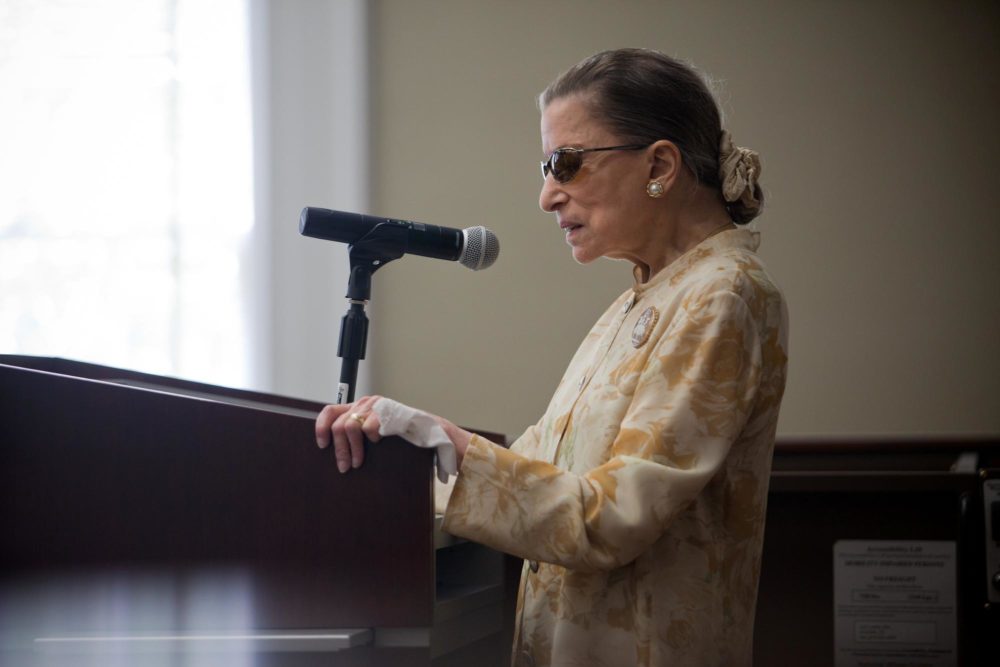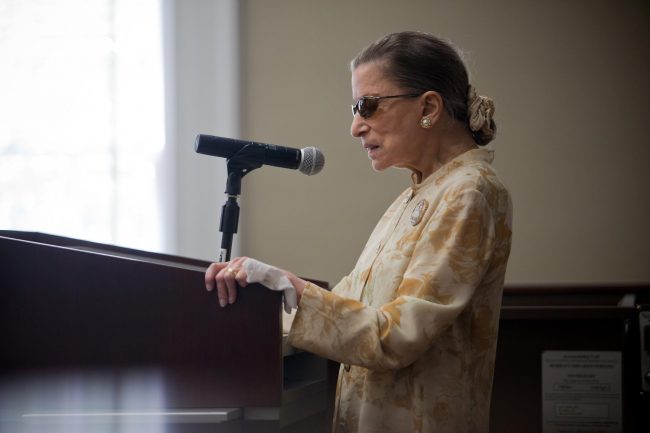
Justice Ruth Bader Ginsburg addresses a Dedman School of Law civil procedure class at SMU on Aug. 29, 2011. (Kim Ritzenthaler/SMU)
U.S. Supreme Court Justice Ruth Bader Ginsburg said that she probably would not have made it to the high court under the current climate claiming the confirmation process has become more partisan.
“I wish we could have a magic wand and go back to those days when the process was truly bipartisan,” she said at the inaugural event of the Louise B. Raggio Endowed Lecture Series.
Dean of the Dedman School of Law, John Attanasio, led a casual conversation with Ginsburg in front of a sold out audience in McFarlin Auditorium Monday night.
Before Attanasio formerly introduced Ginsburg, she came on stage to give a few words about Raggio.
After reading Raggio’s autobiography, “Texas Tornado,” Ginsburg said she was “captivated by her story.”
“I wouldn’t call her a tornado, but instead, a bright star of Texas,” she said.
Raggio, who graduated from SMU Dedman School of Law in 1952, was an advocate for women’s rights and the first woman to serve as an assistant district attorney in Dallas County.
Similar to Raggio, Ginsburg was the second woman to be appointed to the nation’s highest legal court; and she, too, was a supporter of women’s rights.
Instead of lecturing about civil and women’s rights, or her beliefs of the legal system, Attanasio held a question-and-answer session with Ginsburg asking her questions varying on how she balanced being a mother and law school, her experience clerking for Judge Learned Hand and what the toughest part of her career has been, which she said was working with death penalty cases.
The questions started out informal with Ginsburg entertaining the audience with her humorous responses.
She told the story of a time when she was studying for her practice law exam at Harvard University when her 14-month-old daughter, Jane, walked into the dining room
with moth balls shoved in her mouth.
“I attribute my success to her,” she said, explaining that this situation added a new perspective to her career after spending the evening at the hospital. “My practice exam was not that important.”
She kept the lecture light as she continued by telling another story about the time she attempted to clerk for Judge Learned Hand.
Ginsburg began the story by making it clear that Hand would not let women clerk for him because “we [women] would inhibit his language.”
After riding in a car with him, she said she “heard words never heard before,” which prompted her to tell him that it didn’t seem as if she was “inhibiting [his] speech at all.”
The crowd responded to these stories with laughter.
The conversation took a more serious turn when Attanasio asked her questions about past cases that shaped her career as well as changed the law.
Ginsburg talked about Reed v. Reed (1971) and Weinberger v. Wiesenfeld (1975), saying, “We wanted to show that everyday people were affected by arbitrary gender laws.”
She also lectured on the significance of being nominated, and sworn in, as the Associate Justice of the Supreme Court by Pres. Bill Clinton in 1993.
Clinton told her he wanted to have regular dinners with the nine Justices but, “it never happened because he was hit with Paula Jones and then with other things,” according to Ginsburg.
The majority of the lecture was centered on Ginsburg’s biography, rather than her impact on the legal system.
Kevin Eaton, president of the political science symposium, was impressed with Ginsburg but was not impressed with Attanasio.
“At times he [Attanasio] appeared disengaged and frankly bored at the conversation that he was having with Justice Ginsburg,” Eaton said. “I also feel that he steered the conversation away from substantive legal issues and more towards a regurgitation of her biography which, although interesting, was not what many of the people in the audience likely would have liked or expected.”
While Eaton realized that Ginsburg couldn’t elaborate on every question, he did feel as if she wanted to discuss many of the legal issues.
“At times Justice Ginsburg, especially when referring to the gender discrimination cases of the early 70’s, seemed to want to delve into those subjects,” he said. “Attanasio without fail steered her back towards more mundane questions.”









